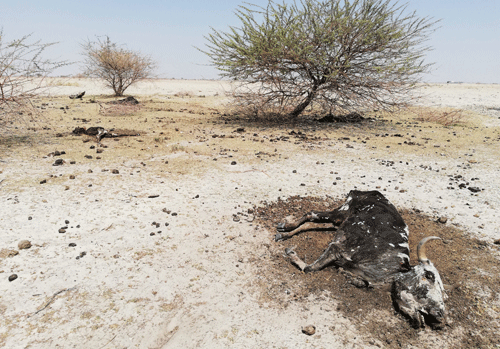ONGWEDIVA – The agriculture ministry has urged northern livestock farmers to sell some of their livestock to avoid losses due to the severe drought situation that has gripped the region.
The ministry’s spokesperson, Jona Musheko, said the need for farmers to reduce their herd size, conserve resources and generate income cannot be overemphasised.
By doing this, Musheko said, it will help offset the costs of managing their livestock during the dry season.
“We have auction kraals in all the 14 regions and we are advising farmers to make use of them and bring their livestock to auction them off before the drought takes a toll on them,” said Musheko, adding that some farmers have already heeded the call.
Most northern farmers are pessimistic that the situation can only get worse.
One of them is Shaun Kapia from Outapi in the Omusati region, who indicated that most farmers are feeling the pinch – “even though the worst is still to come”.
“Communal farmers are the worst affected. Some have even gone to the extent of grazing their animals at the nearest villages, where some grazing is still available,” said Kapia.
Another farmer, Timoteus Timoteus from the Okando village, said their worst drought periods were between 2013 and 2019.
If that is repeated, most farmers will be forced to shut their kraals and gardens permanently, he said.
“For some of us, farming is our only hope. It is not a business but rather a means to an end. So, if the last season’s drought conditions repeat, we might forget about farming, as our animals will not make it through this time around,” said Timoteus.
Another farmer, Ester Shipahu from Oshikuku, said: “I cannot afford to buy fodder for my cattle anymore; I gave up.”
Shipahu has called upon traditional authorities to consider designating some areas as grazing zones for animals to avoid overcrowding, overgrazing and soil degradation.
When New Era yesterday contacted to find out how the region is coping with the current drought and what measures are in place to assist farmers, Omusati governor Erginus Endjala said the situation is under control.
“The livestock support programme will be implemented from 1 October 2023 to 31 March 2024, countrywide. The Office of the Prime Minister will lay down procedures on how the regions are going to do it,” he explained.
OPM
The Office of the Prime Minister (OPM) is expected to roll out the drought relief programme and food assistance to all affected subsistence farmers in rural areas in the 14 regions.
This programme kicks off next month and ends in June next year.
According to the OPM, the assessment was conducted between May and July of 2023 and covered both urban and rural areas in all 14 regions.
Recently, OPM executive director I-Ben Nashandi revealed that Namibia has experienced below-normal and sporadic rainfalls, which culminated in a combination of flash floods and dry spells in some parts of the country.
“This has subjected communities to prospects of lower crop yields, impacts on livestock and ultimately reduced household food stocks, compromising food security at household levels. Poor grazing conditions in most regions across the country have also been observed,” Nashandi said.
Recently, Prime Minister Saara Kuugongelwa-Amadhila said the delay in rolling out drought relief food and various incentives to farmers across the country was caused by a N$600 million budget shortfall.
She revealed these while briefing the Erongo regional leadership that the Disaster Risk Fund currently only has about N$200 million in its kitty, which represents a deficit of N$600 million to achieve the planned full roll-out of N$800 million to reach all farmers.
– vkaapanda@nepc.com.na



